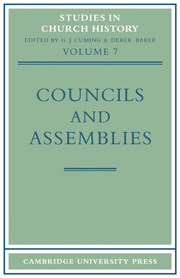Book contents
- Frontmatter
- Preface
- Contents
- Contributors
- Abbreviations
- Public welfare and social legislation in the early medieval councils (Presidential Address)
- National synods, kingship as office, and royal anointing: an early medieval syndrome
- The case of Berengar of Tours
- Ecclesiastica and Regalia: Papal investiture policy from the Council of Guastalla to the First Lateran Council, 1106–23
- Viri religiosi and the York election dispute
- Councils and synods in thirteenth-century Castile and Aragon
- The Byzantine reaction to the Second Council of Lyons, 1274
- The Council of London of 1342
- Education in English ecclesiastical legislation of the later Middle Ages
- The representation of the universitas fidelium in the councils of the conciliar period
- Nicholas Ryssheton and the Council of Pisa, 1409
- The condemnation of John Wyclif at the Council of Constance
- Some aspects of English representation at the Council of Basle
- The Council of Basle and the Second Vatican Council
- The Colloquies between Catholics and Protestants, 1539–41
- King James I's call for an ecumenical council
- John Hales and the Synod of Dort
- Assembly and Association in Dissent, 1689–1831
- The Convocation of 1710: an Anglican attempt at counter-revolution
- Laymen in synod: an aspect of the beginnings of synodical government in South Africa
- The First Vatican Council
- Kikuyu and Edinburgh: the interaction of attitudes to two conferences
Kikuyu and Edinburgh: the interaction of attitudes to two conferences
Published online by Cambridge University Press: 12 March 2010
- Frontmatter
- Preface
- Contents
- Contributors
- Abbreviations
- Public welfare and social legislation in the early medieval councils (Presidential Address)
- National synods, kingship as office, and royal anointing: an early medieval syndrome
- The case of Berengar of Tours
- Ecclesiastica and Regalia: Papal investiture policy from the Council of Guastalla to the First Lateran Council, 1106–23
- Viri religiosi and the York election dispute
- Councils and synods in thirteenth-century Castile and Aragon
- The Byzantine reaction to the Second Council of Lyons, 1274
- The Council of London of 1342
- Education in English ecclesiastical legislation of the later Middle Ages
- The representation of the universitas fidelium in the councils of the conciliar period
- Nicholas Ryssheton and the Council of Pisa, 1409
- The condemnation of John Wyclif at the Council of Constance
- Some aspects of English representation at the Council of Basle
- The Council of Basle and the Second Vatican Council
- The Colloquies between Catholics and Protestants, 1539–41
- King James I's call for an ecumenical council
- John Hales and the Synod of Dort
- Assembly and Association in Dissent, 1689–1831
- The Convocation of 1710: an Anglican attempt at counter-revolution
- Laymen in synod: an aspect of the beginnings of synodical government in South Africa
- The First Vatican Council
- Kikuyu and Edinburgh: the interaction of attitudes to two conferences
Summary
Two conferences of some significance took place shortly before the First World War: the World Missionary Conference at Edinburgh in 1910, and the Kikuyu Conference, held at a Church of Scotland mission station at an out-of-the-way place in East Africa in 1913. In an Ecumenical Age, the fame of the former is likely to endure, the notoriety of the latter to be forgotten. Yet it was the controversy raised by the second conference which caused Lord Morley to remark that the ‘cacophonous’ name of Kikuyu might one day rival in fame that of Trent. Another grand claim was made for Kikuyu by the Bishop of Zanzibar—one with which The Times agreed—that ‘there has not been a conference of such importance to the life of the Ecclesia Anglicana since the Reformation’. And when the Kikuyu controversy was at its height in December 1913, Charles Gore, then Bishop of Oxford, recorded his conviction that the cohesion of the Church of England had never been more seriously threatened. Admittedly Morley was too detached, and the two bishops too involved, for a correct reading of the temperature of the Church of England. But Kikuyu does seem to have brought to the boil discontents which had been simmering for a variety of reasons. A. C. Headlam nicely distinguished between the actual proceedings at Kikuyu, and the agitation whipped up in England ostensibly on its account. One aspect of that agitation, which is especially appropriate to the theme of this volume, is explored here, namely the relationship between two conferences, that at Kikuyu in 1913, and the great World Missionary Conference at Edinburgh in 1910.
- Type
- Chapter
- Information
- Councils and Assemblies , pp. 345 - 359Publisher: Cambridge University PressPrint publication year: 1970



